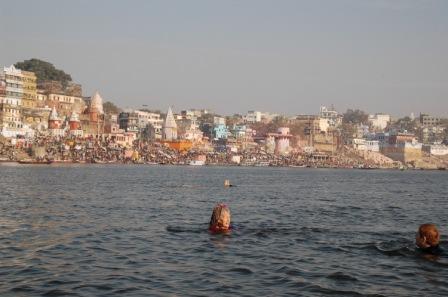I shut the door of my hotel room, turning the key to lock it.I walked slowly down the steps onto the busy street. There was noise, lots of it. The street was full of people strolling and shopping, cars beeping their horns and people on bicycles dodging the traffic. It was mid afternoon, India in full throttle. I tried not to pay attention to it and kept my head down. I walked slowly towards the ghats. I was lost in my thoughts, the surrounds distant. This was India after all, where noise is a constant and only stops for a few hours in the early morning. This is a country that sleeps little – the streets are never empty, there is always the odd cow, person, motorbike or car.
As I continued walking,the sound of people talking and shouting grew louder. What started as a low hum of white 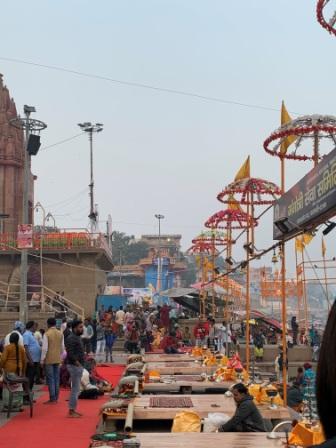 noise became more distinctive. A man walking slightly ahead of me turned around and shouted‘jaldi,jaldi’ – hurry up. His voice carried over my head and I turned to see if the words had reached their target. One woman looked up, noticing but not paying attention. She half smiled and bowed her head again, still listening to the conversation she was having with an older woman – perhaps her mother or her mother in law. None of the children around paid the slightest bit of notice – did they have any children with them?
noise became more distinctive. A man walking slightly ahead of me turned around and shouted‘jaldi,jaldi’ – hurry up. His voice carried over my head and I turned to see if the words had reached their target. One woman looked up, noticing but not paying attention. She half smiled and bowed her head again, still listening to the conversation she was having with an older woman – perhaps her mother or her mother in law. None of the children around paid the slightest bit of notice – did they have any children with them?
Family life in India is sacrosanct and is a microcosm for greater society; moving, shrinking and expanding whenever the need arises. Indians spend most of their time as extended families: living together, visiting each other in distant places, going on holidays and have big fat Indian weddings where the whole family get together to catch up, gossip, drink and dance. Importantly, each family member knows what is expected of them in this unbreakable unit.
I stepped to the side, wondering if the family had brought one of their own loved ones to be cremated. Varanasi is the ultimate place to be cremated or have ashes put in the Ganges.
As I walked, I heard a voice above the rest ‘das rupee’,meaning ten rupees. Street sellers were holding up small offerings for sale. They were made from large green leaves,dried out and cleverly folded using toothpicks. Inside were a few pink rose petals, one single yellow marigold flower and a small handmade tea lamp placed in the middle.
‘You buy, you buy,’ said a young girl as she stepped in front of me.
I looked at her expressionless, casting my eyes down and kept walking. I was determined to focus on my task at hand.
I reached my destination – Sheetla Ghat. I walked down the steps. They were smooth and slippery from wear and
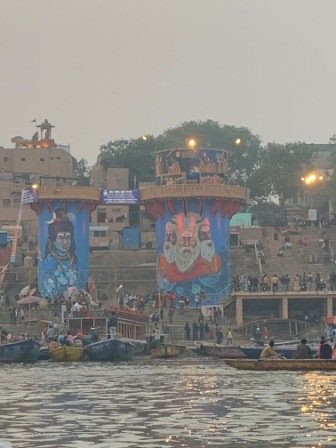
tear. There were many pilgrims at the water’s edge, and I wanted to feel the water, get familiar with it. I put my hand into the water, the mighty Ganges. It was cold and milky, I snapped my hand back. Yuck, how could I swim in that? Soap suds mixed with heavenly water. I gazed out further. I saw water moving, it was cleaner. The self-cleaning current is where dead people’s ashes and partially burnt bodies are thrown in to float down stream to the Bay of Bengal. The Ganges, or Mother Ganga, is Nirvana is the ultimate goal after death for Hindus (and Buddhists) where there is no suffering or desire but a peaceful resting place. I had a sudden flashback of my first visit to Varanasi: of seeing swollen dead bodies, wrapped in a grey cloth which blended in with the body floating past. I wondered if I would have to dodge one of these.
The voices of my friends interrupted my thoughts.
‘Hey Shaz.’My friends came into view, I smiled and waved – relieved and terrified all at once.
Why had I agreed so many months ago that I would swim the Ganges in Varanasi – one of the most polluted rivers on earth for the occasion of my fiftieth birthday. Was I insane?Apparently!
My friends Ant and David walked towards me, smiling. Ant, already in her 70’s, was going to be the other swimmer. She had already completed the swim twice before. David, in his 20’s and a budding photographer, was going to record the event. They had lined up the boatman and we were going to row the other side, so that we would be swimming with the strong current and not against it.
Ant and David chatted with the boatman, finalising the price to row the three of us over to the other side. Ant and I would swim back to where we were standing. David and the boatman would follow beside us. How simple, what could possibly go wrong?
The price fixed, we were ready to go. The boatman held out his hand offering to take our hands as we walked onto the boat. The earlier mist had cleared, churning out a fine mid winter’s afternoon. I looked down at myself, sitting there in my new fisherman’s pants of bright colours and T-shirt. I wouldn’t have them for long. They were bought for the occasion the night before, disposable swimming clothes. India is not a place where you swim in a pair of bathers in public.Covering your body is essential even when swimming the Ganges.
I was quiet throughout the journey over to the other side. I thought about one of the stories I knew about Ganges:that it had an active population of blind dolphins. The dolphins were not completely blind but had a very low level of eyesight. They feed on the plankton that lives just below the water’s surface. While the dolphins are elusive, they have been spotted from time to time. Would I bump into one, the blind leading the blind? I almost wished for it. It would be less confronting than bumping into a floating body.
The boat slowed, we had reached the other side. This was the moment of reckoning, there was no going back. I jumped out into the cold water, fully clothed. I hit the mud, it squished between my toes.
Oh god!
What had I done?
Then I heard a reckless voice, deep inside me, say ‘go for it honey’.
I lunged forward into the water and put one arm in front of the other. My body was in slow motion. I focused on my breathing. I told myself turn your head to the right, breathe in through your nose, then out of the corner of your mouth, in through your nose, turn your head to the left side, breathe in through your nose, out through your mouth in through your nose. Repeat. My rhythm started. I made a mental note to keep my mouth firmly shut, remembering all those dead bodies floating in the water and not wanting it washing through my mouth.
The water was clear, it gave me more confidence. I imagined I was swimming the English Channel, all lathered up with imaginary Vaseline to keep me warm and mobile. I could feel the clothes dragging against my skin. It was hardly the English Channel but I was enjoying the challenge and the foolishness of it all. Who else gets to swim the Ganges for their fiftieth birthday?
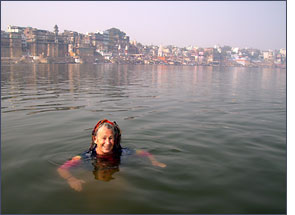
My body started to tire. I stopped and treaded water, looking around to see where Ant was. She was way ahead. I checked for the boat. David waved and I felt a small warmness in the pit of my stomach, someone was there looking out for me. But then I noticed that I was only a third into the swim, and still had a long way to go.
I put my head down and kept going. Stroke after stroke, feelinglike the only thing in the world was to be there; no fear of the soap suds, toxic waste, floating bodies, animal carcasses and excrement that polluted the water I was immersed in.
The flow of the water intensified. I figured I was starting to hit the middle where the tide was the strongest. My arms started to tire and my breathing started to labour. My chest tightened. Oh yes, I had forgotten about the cough which been lingering for the past couple of days.
Could I keep going? I looked up. Ant was nowhere to be seen, she was in front; and the boat was ahead somewhere between her and me. I was getting slower, there was no one to rescue me now so I would have to keep going. I tried to focus – if I just did freestyle slow motion, it would get me there. I started again, breathing in, stroke, breathing out.
I was opening my mouth letting the polluted Ganges water wash in and out of my mouth.How long had I been doing that, god I would surely die now! It was hard to breathe. My limp slow strokes were not enough to keep the force of the current from washing me downstream. I looked up and saw myself moving further away from the boat. I stopped and treaded water. My breath was shallow and kept getting caught in my chest cavity, not going any further. I started to hyperventilate and felt panic rising. Wouldn’t it be good if a blind dolphin came by and helped me to swim, just like the movies. I smiled at the thought, and the panic subsided lightly.
But the current was still strong, and it carried me further downstream. I saw my end point – the large buildings in front of the main ghat. I felt a calmness come over me, all I needed was to tread water and I would drift to the place where there were many people. Someone would see me and rescue me. I drifted on, feeling my arms, legs and torso resting. My mind had the help of massive doses of adrenaline to power on. Survival was key now.
Then a thought: why hadn’t it thought it before, breast stroke! That would keep my head out of the water and save my arms, and I could let my solid legs do all the work. I had power back. I kept going. My hands gliding under the water, legs kicking out, deep breaths in, projecting my body forward then breathing out. I was moving again, the ghat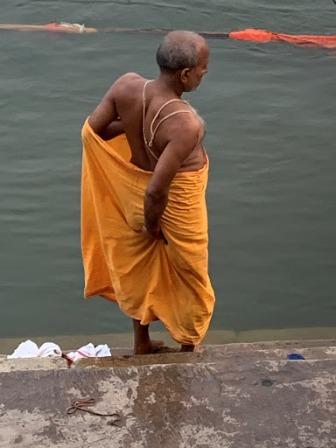 was around 100 meters away. I could see David and the boatman rowing closer.
was around 100 meters away. I could see David and the boatman rowing closer.
David came up beside me as I treaded water.
‘Are you ok?’
I nod. I wasn’t and he knew it.
‘Do you want to jump in and come back by boat?’
I felt a power surge, adrenaline kicked in. ‘No thanks, I’ll finish what I started’. I saw the outlines of the pilgrims bathing in this pure water, so close. Nirvana waited with open arms.

